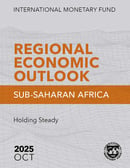At a Glance
- Current IMF membership: 191 countries
- Angola joined the Fund on September 19, 1989.
- Total Quota: SDR 740.1 million
- Budget summary tables drawn from the Government 2018 budget document
- Latest High Frequency Macroeconomic Data, May 2022 (Excel file)
Office Activities
Listen to the radio interview - available in Portuguese only.
November 14, 2023
Presentation by Mr. Eyraud at the Catholic University de Angola of the latest Regional Economic Outlook for Sub-Saharan Africa (português)
The IMF team comprised of Ms. Pattillo, Ms. Mossot, and Resident Representative Mr. Lledo was welcomed by over 110 participants: lecturers, professors and a majority of students.
November 1, 2023
Presentation of Fall 2023 Regional Economic Outlook at Museu da Moeda, Banco Nacional de Angola. (português)
The Governor of Central Bank, Deputy Governor of Central Bank, Minister of Finance, State Secretary for Finances and Treasury, Resident Representative of AFDB; from the IMF was Ms. Pattillo, Mr. Eyraud, and Resident Representative, Mr. Lledo participated in a panel discussion. PDF includes youTube link, photos, PPT presentation, and related media links.
November 1, 2023
IMF's Work on Angola
No results found. Either there was an error with the web service or there is no data returned by the web service.
Regional Economic Outlook
October 16, 2025

The outlook for Sub-Saharan Africa is showing resilience, despite a challenging external environment with uneven prospects in commodity prices, still tight borrowing conditions, and a deterioration of the global trade and aid landscape.
Read the Report
Fraudulent Scam Emails Using the Name of the IMF
For more information please see Fraudulent Scam Emails Using the Name of the IMF
Departmental Papers on Africa
 The Departmental African Paper Series covers research on sub-Saharan Africa conducted by International Monetary Fund (IMF) staff, particularly on issues of broad regional or cross-country interest. The views expressed in these papers are those of the author(s) and do not necessarily represent the views of the IMF, its Executive Board, or IMF Management.
The Departmental African Paper Series covers research on sub-Saharan Africa conducted by International Monetary Fund (IMF) staff, particularly on issues of broad regional or cross-country interest. The views expressed in these papers are those of the author(s) and do not necessarily represent the views of the IMF, its Executive Board, or IMF Management.



